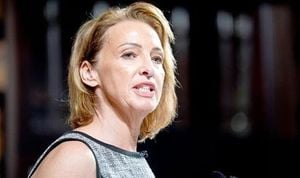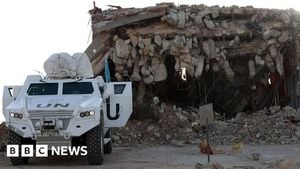On a brisk Saturday evening at Dublin Castle, the air was thick with anticipation and the hum of change. Catherine Connolly, a 68-year-old left-wing independent politician, stood before a jubilant crowd, her face alight with excitement as the results of Ireland’s presidential election were declared. Connolly, a veteran lawmaker known for her outspoken views on foreign policy and social justice, had just secured a landslide victory—winning 63% of the vote and decisively defeating former Cabinet minister Heather Humphreys, her center-right rival. It was a moment that, according to NPR, signaled a generational and ideological shift in Irish politics.
“I will be a president who listens, who reflects and who speaks when it’s necessary,” Connolly told her supporters, her words echoing across the historic halls of the castle. “Together we can shape a new republic that values everybody.” It was a promise rooted in her own journey—a story that began in a social housing unit in Galway, where she grew up as one of 14 children. Her mother died when she was just nine, and her father, a shipyard worker, struggled to provide for the family. These early experiences, as reported by Press TV, shaped Connolly’s deep commitment to social justice and her empathy for those on the margins.
Connolly’s political rise has been nothing short of remarkable. After earning degrees in clinical psychology and law, she practiced as a lawyer before entering politics in 1999 as a Labour Party member on Galway City Council. Five years later, she became mayor of Galway, and in 2007, she left Labour to pursue her career as an independent. Her reputation as a forceful advocate for equality and her willingness to challenge the status quo grew during her nine years as an opposition socialist lawmaker in the Irish parliament. By 2016, she was elected as an independent lawmaker for Galway West, and in 2020, she made history as the first woman to serve as deputy speaker of Parliament’s lower house, according to NPR.
Connolly’s campaign for the presidency drew support from left-leaning parties, including Sinn Féin, the Labour Party, and the Social Democrats. Her message resonated especially with younger voters, who valued her unapologetic stance on issues like social justice, diversity, and, perhaps most notably, Palestine. As Press TV and BBC reported, Connolly has been outspoken in her condemnation of Israel, referring to it as a “terrorist state” and accusing it of genocide in Gaza. “If we in this Dáil can’t recognise that Israel is a terrorist state, then we’re in serious trouble,” she declared in a video posted to her campaign’s Facebook page in June.
Her pro-Palestinian views became a defining feature of her campaign. At a September event, Connolly drew parallels between Ireland’s history of colonization and the plight of Palestinians, cautioning against foreign powers dictating the fate of sovereign peoples. “The Palestinians must decide in a democratic way who they want to lead their country,” she asserted. She also described Hamas as “part of the fabric of the Palestinian people,” noting that it was elected in 2006 before the Israeli blockade of Gaza. Connolly emphasized that Hamas is “part of the civil society of Palestine,” and that casualty figures from the region often come from Hamas because it controls public institutions, including the health ministry. These remarks, while controversial, endeared her to many voters who saw her as a principled voice for global human rights.
Connolly’s positions stretched beyond the Middle East. She has consistently criticized U.S. involvement in global conflicts, particularly where American funding supports military operations. “Genocide was enabled and resourced by American money,” she stated during the final televised presidential debate, as reported by Press TV. Her skepticism toward U.S. foreign policy extended to President Donald Trump, whom she described as “volatile, unpredictable, acting like a bully.” Connolly warned that the humanitarian crisis in Gaza was being overlooked in favor of economic concerns, drawing a historical parallel: “Famine has been created in Gaza like it was in Ireland in 1845, a man-made famine.”
Her criticisms did not stop with the U.S. Connolly has also been a vocal opponent of the Western military-industrial complex, NATO, and the European Union’s increasing militarization, especially in the wake of Russia’s invasion of Ukraine. She drew comparisons between current EU armament trends and Nazi-era rearmament in the 1930s, questioning the motivations behind NATO’s eastward expansion. “What is behind their motivation is simply an arms industry, more war,” she argued. “That needs to be called out over and over.” Connolly has consistently stressed the importance of Ireland’s tradition of military neutrality, advocating for a referendum on the government’s proposal to remove the “triple lock”—the set of conditions required for deploying Irish soldiers on international missions.
Despite the largely ceremonial nature of the Irish presidency, Connolly’s election has sparked both domestic and international reactions. Heather Humphreys, her defeated rival, graciously conceded and said, “Catherine will be a president for all of us, and she will be my president, and I really would like to wish her all the very, very best.” The election was also hailed by prominent figures like Irish documentary filmmaker Sean Murray, who called it “a win against corporatism, war criminals, corruption and all the dirty tricks of the establishment. But most of all an emphatic win for the Irish people.”
International observers have taken note of Connolly’s outspoken foreign policy positions, particularly her stances on Gaza and NATO. As BBC noted, her willingness to challenge the political establishment and speak out on contentious issues sets her apart from her predecessors. Connolly herself has pledged to focus on listening and reflection, stating, “Together we can shape a new republic that values everybody, that values and champions diversity and that takes confidence in our own identity, our Irish language, our English language, and new people who have come to our country.”
For many in Ireland, Connolly’s presidency represents more than just a changing of the guard. It’s a signal that the country is ready for a leader who will confront traditional approaches to foreign policy, challenge controversial military alliances, and bring social justice to the forefront of national discourse. Domestically, experts believe her tenure may strengthen the visibility of left-wing positions on equality and inclusivity. Internationally, she may guide Ireland toward a more assertive stance on humanitarian issues, consistent with the convictions she has articulated throughout her career.
As Catherine Connolly prepares to take up her role as Ireland’s tenth—and third female—president, her victory stands as a testament to the power of principled leadership and the enduring appeal of a politics rooted in empathy, justice, and an unwavering commitment to peace.




